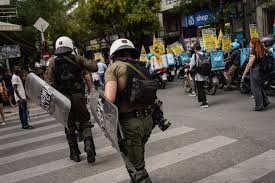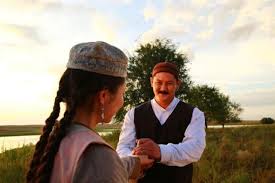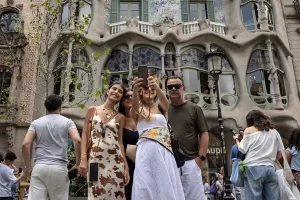In Greece, Anger over Pakistani Man’s Death in Police Custody

One day last month, Muhammad Kamran Ashiq stopped answering phone calls. His cousin Wajid Razzaq kept trying to get in touch with him, but the phone just rang. Still, Razzaq didn’t worry too much. He figured Ashiq was staying with his brother or visiting a friend.
The cousins both came to Greece from Pakistan’s Kashmir region. Ashiq, 37, made the journey two decades ago, and 32-year-old Razzaq moved to Athens 12 years back. Even as his concern grew, Razzaq thought his cousin, who worked as a food delivery driver, was fine. Ashiq had legal residency documents, spoke Greek fluently, and knew his way around.
Then, on Sept. 19, Razzaq’s calls to his cousin started going straight to voicemail. “I thought something bad could have happened,” he recalled.
The next couple days, Razzaq phoned hospitals and police stations around town to see if anyone might know where Ashiq was. He had little luck at first, but shortly after midnight on Sept. 21, he explained, an officer at the Agios Panteleimon Police Station told him that was Ashiq was there in a jail cell. Razzaq asked why, and the officer said Ashiq was in the country illegally. Razzaq offered to bring his cousin’s residency documents right away, but the officer told him to come the next morning.
The next morning, Razzaq and a few friends went to the station in Agios Panteleimonas, hoping to show the police Ashiq’s documents and take him home. When they got there, Razzaq said, the officers on shift wouldn’t let him go inside to see his cousin. After some back and forth, the police allowed a Greek friend of Razzaq’s inside.
When she came back outside, the Greek friend told Razzaq, “He’s gone.”
Razzaq didn’t understand. If the police had released his cousin, he thought, they needed to go find him. The friend was now in tears. No, she explained. Ashiq was dead.
Later that day, Razzaq went to the morgue. There, he saw the bruises and welts all across his cousin’s lifeless body. Razzaq took photos of the wounds. “We thought they’d beat him in the police station,” he explained.
Soon, photos of Ashiq’s body appeared in local newspapers and spread online. The Hellenic Police have claimed that Ashiq had been in a minor altercation with fellow detainees in custody. The authorities said Ashiq was found dead on the morning of Sept. 21, though they offered no detailed explanation of how he died.
Yet, rights groups and activists have their doubts. Greece has a long history of both police violence and far-right attacks on refugees and migrants. In 2023, the Racist Violence Recording Network (RVRN) watchdog documented at least 158 hate crimes in the country. More than half targeted refugees and migrants, and law enforcement officers were perpetrators in at least 24 such hate crimes.
Conflicting Accounts
The news quickly made the rounds in Greek media, and in the days following Ashiq’s death, reporters published details of a police report that raised more questions than it answered. The report described Ashiq as undocumented — he had legal residency papers. It claimed he didn’t speak Greek — he knew the language fluently. It listed him as homeless — he rented an apartment in Athens.
On Sept. 26, the Hellenic Police put out a statement that said officers had last detained Ashiq in the early hours of Sept. 18. The statement said officers had already detained Ashiq in recent days for an alleged instance of domestic violence and released him after confirming that he was in the country legally.
According to that statement, officers were answering a call about a man who had followed a woman home and was trying to get in the building. The woman declined to press charges, but officers took Ashiq into custody because he was injured and under “the obvious influence” of alcohol or drugs.
At the police station, the statement alleged, Ashiq had “launch[ed] an attack” and tried to break a bathroom sink. The police held him on charges including property destruction, refusing to take fingerprints, and disruption of service, among others. The statement said a medical crew examined Ashiq and found that he had no serious injuries at the time.
On the morning of Sept. 18, after taking Ashiq to court, where he was reportedly convicted and sentenced, police returned him to the station in Agios Panteleimonas.
Overnight on Sept. 21, after a “small-scale incident” with other detainees, officers moved him to another holding area. The next morning, police claim, officers found him dead in his cell. According to the statement, an investigation into the circumstances surrounding Ashiq’s death is already underway.
The police have also told local media that there was no security camera in the area where Ashiq died. Speaking to the Greek daily Kathimerini, Maria Sfetsou, a lawyer representing Ashiq’s family, criticized the police for apparent inconsistencies in their account and for not simply confirming Ashiq’s legal documents and releasing him.
After Ashiq’s death, the Movement United Against Racism and the Fascist Threat (KEERFA) claimed police had not allowed Ashiq to speak to a lawyer, transferring him between five different police stations throughout his time in custody.
As questions continue to mount, Human Rights Watch has called for “an immediate and thorough investigation,” describing Ashiq’s death as a “somber reminder that Greece needs to adopt a ‘zero tolerance’ approach to police violence.”
“Political Racism”
Meanwhile, anger has continued to swell among migrant workers and anti-racist groups. On the afternoon of Saturday, Oct. 12, hundreds of protesters gathered in the Greek capital’s Viktoria Square, an area where many refugees and migrants live. “The workers united,” read a banner near the front, “will never be defeated.”
A motorcade of dozens of Pakistani food delivery drivers led the demonstrators as they set out on a march. Attached to their motorcycles were placards bearing photos of Ashiq’s battered body at the morgue. Columns of riot police followed the march on either side. Local residents gathered on balconies and watched as the motorcade inched through the city center, honking their horns and chanting against police violence.
Javed Aslam, the president of the Pakistani Community of Greece advocacy group, said no one believed the police’s account. “We demand justice,” he said. “If there is no justice, it means the government itself is responsible for the bloodshed [against] immigrants.”
Aslam, who moved to Greece in the 1990s, has spent decades sounding the alarm on racist violence against migrant workers and refugees. In July 2019, the right-wing New Democracy party came back to power after campaigning, in part, on promises to crack down on refugee arrivals. Last year, New Democracy won re-election with more than 40% of the vote.
To Aslam, Ashiq’s death was a symptom of the government’s anti-migrant policies. “This is because of the government’s political racism,” he added.
“Justice for His Family”
As the march neared the police station in Agios Panteleimonas, Naim Elghandour, head of the Muslim Association of Greece, said that throughout his five decades in the country, he had “never encountered racism from the police like now.”
Elghandour has long advocated for the rights of Muslims, refugees, and migrants in Greece. During the rise of the neo-Nazi Golden Dawn party in the early 2010s, he campaigned for far-rightists who attacked migrants to face accountability. A court banned Golden Dawn in 2020, but to Elghandour, the situation for migrants is again taking a turn for the worse. “This is an extreme far-right government,” he said.
Meanwhile, the Hellenic League for Human Rights said in a report last month, recent years have witnessed “a phenomenon of widespread police brutality and arbitrariness that deals a significant blow to democracy and the rule of law in Greece.”
For his part, Wajid Razzaq was thankful that so many people had come out to protest on behalf of his cousin, but he hoped they would continue to rally. He explained that Ashiq’s wife and children, who are aged between three and seven, were in mourning back in Pakistan. “We want justice for his family,” he said.





